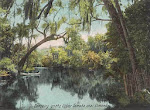Free Fantasia on Japanese Themes
All the afternoon there has been a chirping of birds,
And the sun lies warm and still on the western sides of swollen branches,
There is no wind;
Even the little twigs at the ends of the branches do not move,
And the needles of the pines are solid
Bands of inarticulated blackness
Against the blue-white sky,
Still, but alert;
And my heart is still and alert,
Passive with sunshine,
Avid of adventure.
I would experience new emotions,
Submit to strange enchantments,
Bend to influences
Bizarre, exotic,
Fresh with burgeoning.
I would climb a sacred mountain,
Struggle with other pilgrims up a steep path through pine-trees,
Above to the smooth, treeless slopes,
And prostrate myself before a painted shrine,
Beating my hands upon the hot earth,
Quieting my eyes upon the distant sparkle
Of the faint spring sea.
I would recline upon a balcony
In purple curving folds of silk,
And my dress should be silvered with a pattern
Of butterflies and swallows,
And the black band of my
obi
Should flash with gold circular threads,
And glitter when I moved.
I would lean against the railing
While you sang to me of wars
Past and to come —
Sang, and played the samisen.
Perhaps I would beat a little hand drum
In time to your singing;
Perhaps I would only watch the play of light
Upon the hilt of your two swords.
I would sit in a covered boat,
Rocking slowly to the narrow waves of a river,
While above us, an arc of moving lanterns,
Curved a bridge,
A hiss of gold
Blooming out of darkness,
Rockets exploded,
And died in a soft dripping of colored stars.
We would float between the high trestles,
And drift away from other boats,
Until the rockets flared soundless,
And their falling stars hung silent in the sky,
Like wistaria clusters above the ancient entrance of a temple.
I would anything
Rather than this cold paper;
With outside, the quiet sun on the sides of burgeoning branches,
And inside, only my books.
~~
Amy Lowell (1874-1925)
From Pictures of the Floating World, 1919
[
Poem is in the public domain in Canada, the United States, and the European Union]
Amy Lowell biography
















.jpg)